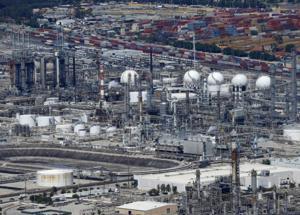West African oil booms as refineries cash in on high margins
LONDON (Reuters) — Booming refinery profits are helping West African oil producers sell cargoes quickly, aided by a shortage in certain types of crude amid OPEC production cuts and Venezuelan troubles.
A fight for sour crude has helped keep Angolan oil in high demand and now, even long-suffering Nigerian grades are finding keen buyers in the United States and Asia as refineries run full steam on strong margins.
"Everything has been so supportive and bullish these past three or four weeks," one trader said, adding that between draws from storage and strong margins, "refiners are buying up ahead of normal timeline to make sure they don't miss out."
US refinery margins rallied to a two-year high on Tuesday, while analysts FGE said Europe's refinery runs were on track for a six-year high for August before Europe's largest oil refinery went into an unplanned shutdown over the weekend. FGE said that amid strong profits, other refineries would pick up much of the slack.
A cut in Venezuela's supply of heavy crude to US refiner Phillips 66, in part due to quality problems, is helping to send more Angolan oil west.
A trade source said Phillips 66 bought September Angolan cargoes, with Hungo, Olombendo, Plutonio and CLOV destined for that refiner and others. Nearly 8 MMbbl of Angolan oil loaded for the United States and Canada in July, according to Reuters data, the highest in at least a year.
Asian buying, particularly competition between independent "teapot" refiners and Chinese state-run Unipec, is another key support.
Differentials for Angola's Cabinda, at 40 cents/bbl, stand at a three-year high. Girassol, at a 50-cent premium, is also at its highest since 2014, while a whopping two thirds of Angola's September exports sold the same week they emerged.
Angola, while participating in output cuts organized by the Organization of the Petroleum Exporting Countries, is benefitting from lower Saudi exports.
"Angolan grades can replace some fuel-oil-rich crudes from the Middle East," said Ehsan Ul-Haq, director of crude and refined products with consultancy Resource Economist, adding that buyers are keen in part due to strong profits for sulfur-rich fuel oil.
The sour strength is also boosting Nigerian oil, which has a lower sulfur content and produces more fuels such as gasoline. Light crudes suffered because most production additions this year, from US shale, Libya and Nigeria, were light crude. But the sour shortage led some buyers to shift to light oil.
Competition among buyers has boosted offers for Nigeria's Forcados to as much as $1.70 above dated Brent, while offer levels climbed for nearly all other grades. The cargoes are also selling smoothly, in contrast to recent months in which they lingered well after the programs were issued.
"Some buyers are now managing to switch to lighter crudes—buyers in the United States and China too," another trader said. "Refiners see the margins and run."
Reporting by Libby George; Editing by Dale Hudson







Comments